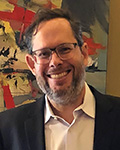
Prof. Rogério de Sousa
University of VictoriaCourriel : rdesousa@uvic.ca
Site web de conférencier : www.web.uvic.ca/~rdesousa/
 |
Prof. Rogério de SousaUniversity of VictoriaCourriel : rdesousa@uvic.ca Site web de conférencier : www.web.uvic.ca/~rdesousa/ |
Quantum behavior can be exploited to create a computer that works with superpositions and entangled states of zeros and ones. This so called quantum computer is exponentially faster than conventional computers for certain problems, most notably the ones requiring linear algebra (e.g. matrix diagonalization and solution of linear systems) and simulation of quantum systems such as molecules and materials. I will give an informal overview of how quantum computer hardware can be made, using "artificial atoms" as quantum bits (qubits) based on superconducting chips. I will show how you can access these systems over the cloud to run your own experiments, and how we use this to teach quantum computing to second year undergraduate students in science and engineering at University of Victoria. Finally, I will give an overview of the problems we are working on in my research group, related to understanding and mitigating the impact of noise in quantum hardware and software.
My research is on how to design quantum hardware with less noise, with particular focus on photons and superconducting materials. More recently we also became involved with research related to how to implement quantum algorithms with the cloud-based quantum computers from IBM and D-Wave. I have collaborators at other universities and national labs in multiple countries (Brazil, Canada, France, USA, etc). I have an ongoing collaboration with scientists at D-Wave Systems Inc., where we investigate the sources of noise and how to reduce them in the D-Wave quantum processor. Last year (2020) I became involved with the implementation of the British Columbia Quantum Algorithms Institute, based at the Surrey campus of Simon Fraser University. With leading companies in our area (1Qbit and D-Wave), our province recognizes the opportunity to develop a quantum ecosystem that can compete worldwide in the development of this exciting new technology. This includes a multi-university effort to form more professionals with expertise in quantum hardware and software. For more information on what is going on in B.C. related to quantum computing, check out our Quantum-BC webpage, http://quantum-bc.ca/. I also teach the course "Introduction to Quantum Computing" which is targeted at 2nd year science and engineering students.